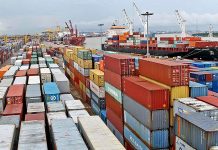
Global retail giants, including Amazon and IKEA, have announced their commitment to move their products off of fossil-fueled maritime cargo ships by 2040. Environmental organisations, however, claim that this action is insufficient to confront the climate and public health crises tied to the ocean shipping sector.
Ship It Zero coalition which is led by the environmental groups Pacific Environment and Stand.earth, as well as its supporters, are calling on major retail brands to take immediate action for the reduction of their climate and health-harming maritime pollution by shifting entirely to zero shipping emissions by 2030, a decade earlier than today’s commitment.
This earlier goal will ensure the shipping industry does its fair share to keep global warming under 1.5 degrees Celsius, the target needed to avoid the worst consequences of the climate crisis, according to scientists.
“We are thrilled by the historic commitment from Amazon, IKEA and other major goods owners to move their products off of fossil-fueled cargo ships, but it does not go far enough,” said Madeline Rose, Climate Campaign Director, Pacific Environment.
“We’re asking Big Retail to be the first movers in shipping’s clean energy transition — not just float along — which means a 2040 target date is not sufficient,” she explained
The Ship It Zero coalition applauds certain details of the announcement, including that the companies will define zero-carbon fuels based on “lifecycle greenhouse gas” analysis, ensuring that fossil-derived hydrogen will not meet their criteria; they will not consider fossil gas, or ‘Liquified Natural Gas,’ a zero-carbon fuel in their ocean shipping transitions; and they are calling for mandatory policy actions from the government.
However, the coalition worries that firms did not mention specific actions specify actions to end ship pollution and they do not include parallel commitments to ending air pollution from ocean shipping, including sulfur oxide, nitrous oxide, and particulate matter pollution.
“Today’s pledge is an important guidepost for the future of maritime shipping, but 2040 is simply too distant a horizon for the retail sector to address the enormous health and climate impacts from its cargo ships,” noted Shipping Campaigns Director, Stand.earth, Kendra Ulrich, who went on to point out that if major retail brands want to do their fair share on climate change, they need to be on a course correction now, not 19 years later.
“While we thank Amazon, IKEA, Patagonia, and other retailers for making a historic commitment to zero-emissions ocean cargo shipping, this commitment does not address our current port pollution crisis. We need companies to take accountability now — by committing to 100% zero-emissions ocean cargo shipping this decade,” commented Dawny’all Heydari, Ship It Zero Campaign Lead, Pacific Environment.








